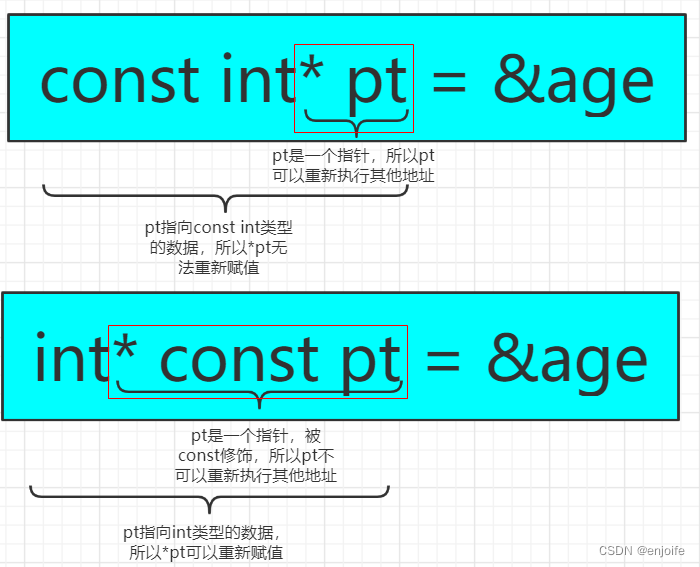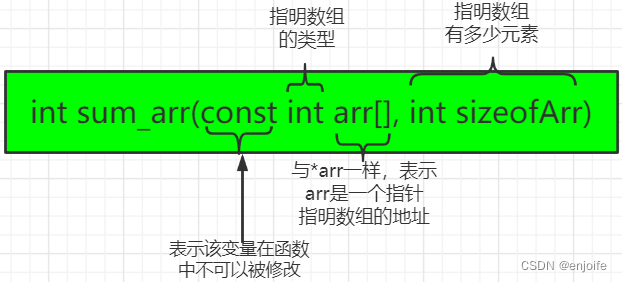1. 当且仅当用于函数头或函数原型中时,int* array和int array[]含义才是相同的。都意味着array是一个int型指针。一般当指针指向数组的第一个元素时,用数组表示法,而指向一个独立值时,用指针表示法。
2. array[i] = *(array + i):表示数组第i个元素的值
&array[i] = array + i:表示数组第i个元素的地址。
3. 数组作为参数:实际并没有传递数组的内容,而是将数组的地址,元素种类,元素个数传递给函数。(常规变量传递的是copy,数组时,由于是地址,所以是原来的数组而不是copy)
4. 根据数据的存储方式和使用方式来定义数据的类型。
5. 指向常量的指针:const int* pt = &a; *pt为const,即无法使用指针修改*pt的值;但是pt可以其他地址;
区分指针本身是常量:int* const pt = &a; * const pt为常量指针,所以pt不能指向其他地址,但是*pt可以修改。

6. C++禁止cost地址赋给非const指针。
7. 函数定义时,参数尽量使用const:避免数据被无意间修改引发bug;const可以接收const和非const参数。如果不加const只能接收非const参数。

1 /*
2 * auther: tianqiang
3 * date:2022/06/26
4 * decription: 数组作为函数参数传递
5 * 实际传入的是数组的首地址,和元素种类和元素个数
6 * 计算数组大小:sizeof(数组名)/sizeof(元素类型)
7 */
8 #include<iostream>
9 using namespace std;
10
11 int sumArray(const int array[], int size); //如果指向的是数组的第一个元素,则用这个形式更直观
12 int sumPointer(const int* aPointer, int size); //如果指向的是一个独立的值,则使用这个形式更直观
13 int sumArrayPointer(const int* begin, const int* end); //通过传递两个指针来指定数组区间:数组区间传递
14
15 int main()
16 {
17 int score[5] = {60, 90, 100, 98, 99};
18 cout << "sizeof score = " << sizeof(score) << endl;
19 int totalScore = sumArray(score, sizeof(score) / sizeof(int));
20 cout << "totalScore = " << totalScore << endl;
21
22 int total = sumPointer(score, sizeof(score) / sizeof(int));
23 cout << "total = " << total << endl;
24
25 int totalAP = sumArrayPointer(score, score + sizeof(score) / sizeof(int));
26 cout << "totalAP =" << totalAP << endl;
27 }
28
29 int sumArray(const int array[], int sizeofArray)
30 {
31 int total = 0;
32 for (int i = 0; i < sizeofArray; i++)
33 {
34 total += array[i];
35 }
36 return total;
37 }
38
39 int sumPointer(const int* aPointer, int size)
40 {
41 int total = 0;
42 for(int i =0; i < size; i++)
43 {
44 total += aPointer[i];
45 }
46 return total;
47 }
48
49 int sumArrayPointer(const int* begin, const int* end)
50 {
51 const int* pt;
52 int total = 0;
53 for(pt = begin; pt !=end; pt++)
54 {
55 total += *pt;
56 }
57 return total;
58 }
59函数无法返回字符串,但是可以返回字符串的地址。这样做更加高效。
结构体变量的行为更接近于基本变量:按值传递,可以互相赋值,取地址使用&。
如需要多个字符串,可以声明一个string对象数组,而不是char二维数组。
传递引用可以解决效率低和书写形式复杂的问题。
函数指针:函数名,函数在内存开始的地址。
一定要区分传递的是函数的地址还是函数的返回值。
typedef定义类型的别名更加灵活。























 459
459











 被折叠的 条评论
为什么被折叠?
被折叠的 条评论
为什么被折叠?








